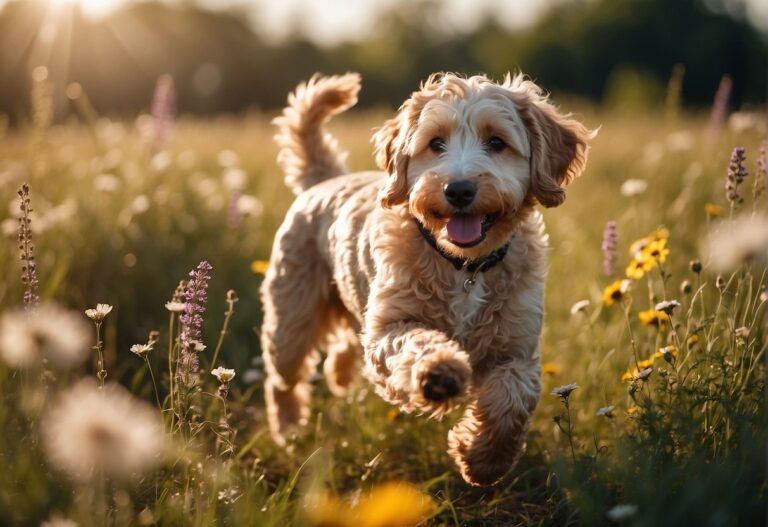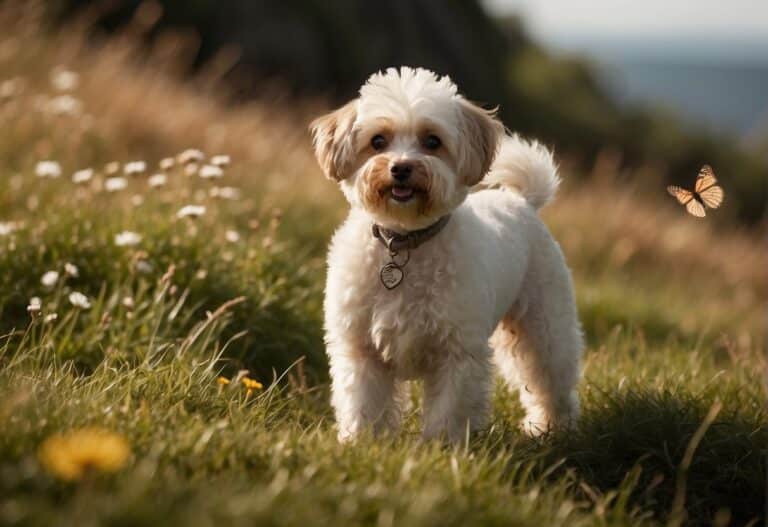Micro Mini Goldendoodle – CharmingTiny Designer Dogs

The Micro Mini Goldendoodle is a designer hybrid that combines the intelligence and hypoallergenic qualities of the Toy Poodle with the friendly and affectionate nature of the Golden Retriever. While not an officially recognized breed, these charming dogs have captured the hearts of many with their small stature and amiable personalities. Typically inheriting the low-shedding coat of the Poodle, they are often favored by those seeking a smaller canine companion that may be more manageable in terms of space and exercise needs.
Equally important to their appealing characteristics is the attention required for their well-being. Prospective owners should be aware of the health issues that may arise in such a crossbreed and understand the grooming, dietary, and exercise requirements of this petite and lively dog. Moreover, training and socialization from an early age are crucial for a well-adjusted pet, as the breed’s intelligence makes them both highly trainable and eager to please.
- Micro Mini Goldiess combines the qualities of Toy Poodles and Golden Retrievers.
- They require proper care, including grooming and attention to health issues.
- Early training and socialization are essential for a well-behaved companion.
Breed Overview of Micro Mini Goldendoodle
In this section, you’ll discover the origins and defining characteristics of the micro-miniature Goldendoodle, offering insights into this endearing hybrid dog.
History and Origin
The micro mini Goldendoodle is a crossbreed smaller than a typical mini Goldendoodle, resulting from breeding a toy or miniature Poodle with a Golden Retriever. The objective is to maintain the desirable traits of Goldendoodles while ensuring a smaller size.
This dog appeared on the scene after the popularity of its predecessor, the Goldendoodle, surged, with breeders aiming to produce a version that is even more suitable for compact living spaces.
Crossbreeding efforts date back several decades, but the down-scaling to micro and mini versions is a more recent trend. Breeders select specific generations of Poodles and Golden Retrievers to achieve a small stature without sacrificing the companionable nature of these dogs.
The precise lineage can differ from F1 to F1B generations (the first cross and a backcross, respectively), impacting size and characteristics.
Breed Characteristics
A typical micro Goldendoodle stands significantly below the range of standard Goldendoodles when it comes to size. Measuring about 13 inches in height and often weighing less than 25 pounds, these canines fit comfortably into many living situations, including apartments. Their lifespan mirrors that of larger Goldendoodles, generally around 10 to 15 years, provided they receive proper care.
The breed inherits a mix of traits from their Poodle and Golden Retriever parents. Typically, they have a friendly and affectionate demeanor, making them excellent family pets. Their coat can vary from curly to wavy, and while no dog is completely hypoallergenic, many micro Goldendoodles are celebrated for their reduced shedding.
Your micro Goldendoodle’s demeanor and physical attributes will be a unique blend of their parent breeds, ranging from the intelligence and trainability often associated with Poodles to the loveable and patient temperament of Golden Retrievers.
Health and Care
When it comes to your Micro Mini Golden Poodle’s well-being, understanding the specific health concerns, grooming needs, and dietary requirements will help you provide the best care possible.
Common Health Concerns
Your Micro Tiny Goldendoodle may be prone to certain health issues such as hip dysplasia, which causes joint pain and can affect mobility. Regular check-ups with a veterinarian are essential to catch and manage these conditions early.
These dogs can also suffer from hypoglycemia, especially in puppyhood, so monitoring their sugar levels is important. Additionally, be aware of possible heart defects and inheritable conditions like skin irritations.
Grooming and Maintenance
Micro Miniature Goldendoodles typically have a hypoallergenic coat that is less likely to shed, making them a popular choice for people with allergies. Despite the low shedding, their coat requires regular grooming to prevent tangles and matting.
Nail Care
Those little paws need attention too! If you hear click-clacking on your floors, it’s time for a trim. Aim to cut your pup’s nails every 3 to 4 weeks. If the thought of wielding clippers near your furry friend’s toes makes you nervous, no worries – your vet or groomer can handle it.
Dental Hygiene
Dental care is often overlooked, but it’s super important. Get your pup used to having their teeth brushed from an early age. Aim for a few times a week if you can. There are also dental chews and toys that can help keep those pearly whites clean.
Diet and Nutrition
A balanced diet is pivotal to your dog’s health. Feed them high-quality food that meets their nutritional needs and consider a diet formulated for small breeds to ensure that they’re getting the appropriate caloric intake. Too much food can lead to weight gain, so stick to a feeding schedule and consult your veterinarian for recommendations. Always have clean, fresh water available to keep them hydrated.
Remember, maintaining a routine with your Micro Small Goldendoodle’s health checks, grooming, and exercise regime will help them lead a happy and healthy life, potentially reaching a lifespan of 10 to 15 years.
Training and Behavior
Training your micro mini Poodle puppy is a process that requires understanding their temperament and intelligence. These dogs are typically easy to train due to their friendly and gentle nature, making them excellent companions.
Training Fundamentals
Intelligence: Your micro-miniature Goldendoodle ranks high in intelligence, which is a trait inherited from both Golden Retriever and Poodle ancestors. This quality makes them responsive to:
- Obedience Training: They can learn commands such as “sit,” “stay,” and “come” with relative ease.
- Socialization: Early socialization is crucial to help your puppy become well-adjusted and confident.
When training, you should:
- Begin early, as young puppies are eager and capable learners.
- Be consistent and patient, using positive reinforcement like praise and treats.
Behavior and Temperament
Your micro mini puppy’s behavior is often friendly and loyal. They exhibit a friendly nature and gentle temperament, making them suitable for families.
It’s important to recognize their exercise requirements; despite their size, they have:
- Considerable energy: Ensure they get regular walks and playtime.
- Adaptability: These dogs adapt well to various living conditions, provided they have enough exercise.
In terms of behavior, remember:
- To provide regular companionship, as they thrive on interaction.
- Their friendly demeanor makes them great at forming bonds, reflecting their deep-seated loyalty.
Living with a Micro Mini Golden Friend
Bringing a Micro Mini Cute Doodle into your life is a delightful experience that combines their petite size with a vibrant personality. These dogs fit well in various living environments and offer a distinct set of characteristics that cater to diverse lifestyles.
Home Compatibility
Your Micro Mini Golden friend typically stands between 7 to 9 inches tall and weighs about 6 to 7 pounds when fully grown, which makes it a suitable match for apartment living. Their small stature means they thrive even in limited space.
It’s important to choose a reputable breeder to ensure your furry friend doesn’t face issues common in teacup goldendoodles, such as liver shunts or seizures. When selecting your pup, consider not just the coat color—which varies in colors—but also the physical health and vitality that ethical breeders are more likely to guarantee.
Lifestyle Considerations
Your new companion will require daily playtime to maintain their moderate energy levels. Despite their small size, they are robust enough to enjoy bonding activities both indoors and out. If you have a backyard, they’ll love a short romp.
However, they can also stay happy with indoor games, making them the perfect family pet. Although they’re often great with children and other pets, supervision is wise since they can be more fragile than larger dogs.
Their coat types—from wavy to curly—can be an advantage for people with allergies due to less shedding. Remember that the cost of a Micro Mini Goldendoodle can reflect their popularity and demand, so ensure you avoid puppy mills and support breeders who prioritize their dogs’ well-being.
Frequently Asked Questions
Before bringing a Micro Mini Goldendoodle into your life, it’s important to know about its size, lifespan, cost, health, temperament, and how to find a reputable breeder.
What is the typical size of a full-grown Micro Mini Golden Poodle?
A full-grown Micro Mini Golden mix generally weighs between 10 to 25 pounds and stands around 10 to 15 inches tall at the shoulder. This makes them one of the smallest variations of Goldendoodles.
Can you provide information on the lifespan of Micro Mini Goldendoodles?
The lifespan of a Micro Mini puppy typically ranges from 12 to 15 years, depending on various factors like genetics, diet, and overall care.
What is the general price range for Micro Mini Goldendoodle puppies?
The price for Micro Mini puppies can vary widely, but you should expect to spend anywhere from $1,500 to $5,000 for a well-bred puppy from a reputable breeder.
Are Micro Mini Goldendoodles known to have any common health issues?
While generally healthy, Micro Mini Goldendoodles can be prone to genetic health issues similar to their parent breeds, such as hip dysplasia, ear infections, and cardiac disorders.
How do Micro Mini Goldendoodles fare as family pets?
Due to their friendly nature and small size, Micro Mini Goldendoodles usually make excellent family pets and are well-suited for various living environments including apartments.
What should one consider when looking for reputable Micro Mini Goldendoodle breeders?
When searching for Micro Mini Goldendoodle breeders, it’s important to look for signs of ethical breeding practices such as health screenings, transparency about the puppy’s lineage, and a clean, nurturing environment for the puppies.






